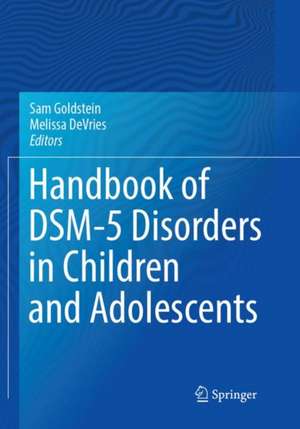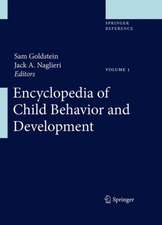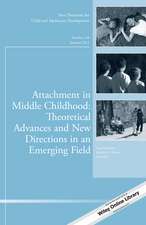Handbook of DSM-5 Disorders in Children and Adolescents
Editat de Sam Goldstein, Melissa DeVriesen Limba Engleză Paperback – 30 aug 2018
This handbook synthesizes and integrates the science of internalizing and externalizing childhood disorders with the diagnostic structure of the Diagnostic and Statistical Manual – 5th Edition (DSM-5) of the American Psychiatric Association. It offers a comprehensive overview of DSM-5 disorders in childhood, covering etiology, symptom presentation, assessment methods, diagnostic criteria, and psychotherapeutic and pharmacological approaches to treatment, prognosis, and outcomes. Clinical vignettes and empirical insights illustrate key concepts and diagnostic and treatment issues such as developmental, cultural, gender, and other considerations that may influence diagnosis and case formulation. In addition, chapters on psychosocial therapies offer robust guidelines for working with children and adolescents with DSM-5 disorders. The Handbook also addresses the shift from categorical to dimensional, diagnostic, and treatment systems, particularly focusing on the current shift in funded research in childhood disorders.
Topics featured in this Handbook include:
- Intellectual disabilities and global developmental delay.
- Depressive disorders in youth.
- Posttraumatic and acute stress disorders in childhood and adolescence.
- Autism spectrum and social pragmatic language disorders.
- Alcohol-related disorders and other substance abuse disorders.
- Parent-child and sibling relationships.
- Cognitive-behavioral interventions and their role in improving social skills.
The Handbook of DSM-5 Disorders in Children and Adolescents is a must-have resource for researchers, professors, and graduate students as well as clinicians, professionals, and scientist-practitioners in clinical child and school psychology, pediatrics, social work, and educational psychology.
| Toate formatele și edițiile | Preț | Express |
|---|---|---|
| Paperback (1) | 1994.72 lei 38-44 zile | |
| Springer International Publishing – 30 aug 2018 | 1994.72 lei 38-44 zile | |
| Hardback (1) | 2503.22 lei 6-8 săpt. | |
| Springer International Publishing – 22 noi 2017 | 2503.22 lei 6-8 săpt. |
Preț: 1994.72 lei
Preț vechi: 2624.62 lei
-24% Nou
Puncte Express: 2992
Preț estimativ în valută:
381.73€ • 414.51$ • 320.66£
381.73€ • 414.51$ • 320.66£
Carte tipărită la comandă
Livrare economică 18-24 aprilie
Preluare comenzi: 021 569.72.76
Specificații
ISBN-13: 9783319861005
ISBN-10: 331986100X
Pagini: 663
Ilustrații: XX, 663 p. 1 illus.
Dimensiuni: 178 x 254 x 40 mm
Greutate: 1.28 kg
Ediția:Softcover reprint of the original 1st ed. 2017
Editura: Springer International Publishing
Colecția Springer
Locul publicării:Cham, Switzerland
ISBN-10: 331986100X
Pagini: 663
Ilustrații: XX, 663 p. 1 illus.
Dimensiuni: 178 x 254 x 40 mm
Greutate: 1.28 kg
Ediția:Softcover reprint of the original 1st ed. 2017
Editura: Springer International Publishing
Colecția Springer
Locul publicării:Cham, Switzerland
Cuprins
Chapter 1. Introduction: DSM-5 Within the Internalizing/Externalizing Framework.- Section I. Internalizing Disorders.- NEURODEVELOPMENTAL DISORDERS.- Chapter 2. Intellectual Disabilities & Global Developmental Delay.- Chapter 3. Language Disorder.- Chapter 4. Specific Learning Disabilities.- SCHIZOPHRENIA SPECTRUM.- Chapter 5. Childhood Onset Schizophrenia Spectrum and Other Psychotic Disorders.- MOOD DISORDERS.- Chapter 6. Bipolar Disorder.- Chapter 7. Depressive Disorders.- ANXIETY DISORDERS.- Chapter 8. Separation Anxiety Disorder & Panic Disorders in Children.- Chapter 9. Generalized Anxiety Disorder.- OBSESSIVE COMPULSIVE AND RELATED DISORDERS.- Chapter 10. Obsessive Compulsive Disorder.- Chapter 11. Body Dysmorphic Disorder.- Chapter 12. Trichotillomania and Excoriation Disorders.- TRAUMA AND STRESS RELATED DISORDERS.- Chapter 13. Attachment Disorders.- Chapter 14. Disinhibited social Engagement Disorder.- Chapter 15. Post Traumatic and Acute Stress Disorders.- FEEDING AND EATING DISORDERS.- Chapter 16. Pica.- Chapter 17. Anorexia Nervosa and Bulimia Nervosa in Childhood and Adolescence.- Chapter 18. Binge Eating Disorder.- Section II. EXTERNALIZING DISORDERS.- NEURODEVELOPMENTAL DISORDERS.- Chapter 19. Autism Spectrum Disorder & Social Pragmatic Language Disorders.- Chapter 20. Attention Deficit/Hyperactivity Disorder.- Chapter 21. Tourette's and Tic Disorders.- Chapter 22. Developmental Coordination Disorder.- ELIMINATION DISORDERS.- Chapter 23. Enuresis.- Chapter 24. Encopresis.- DISRUPTIVE, IMPULSE CONTROL AND CONDUCT DISORDERS.- Chapter 25. Oppositional Defiant Disorder.- Chapter 26. Conduct Disorder.- Chapter 27. Pyromania.- Chapter 28. Alcohol Related Disorders & Other Substance Use Disorders.- RELATIONSHIP PROBLEMS.- Chapter 29. Parent-Child and Sibling Relational Problems.- Chapter 30. Family Disruption.- Section III. Treatment Approaches.- Chapter 31. Cognitive Behavioral Therapy.- Chapter 32. Behavioral Interventions.- Chapter 33. Cognitive Behavioral Interventions to Improve Social Skills.
Notă biografică
Sam Goldstein, Ph.D., is a doctoral level psychologist with areas of study in school psychology, child development, and neuropsychology. He is licensed as a psychologist and certified as a developmental disabilities evaluator in the State of Utah. Dr. Goldstein is a Fellow in the National Academy of Neuropsychology and American Academy of Cerebral Palsy and Developmental Medicine. Dr. Goldstein is an Assistant Clinical Instructor in the Department of Psychiatry. Since 1980, Dr. Goldstein has worked in a private practice setting as the Director of a multidisciplinary team, providing evaluation, case management, and treatment services for children and adults with histories of neurological disease and trauma, learning disability, adjustment difficulties, and attention deficit disorder. Dr. Goldstein is on staff at the University Neuropsychiatric Institute. He has served as a member of the Children’s Hospital Craniofacial Team. He has also been a member of the Developmental Disabilities Clinic in the Department of Psychiatry at the University of Utah Medical School.
Dr. Goldstein has authored, co-authored or edited 38 clinical and trade publications, including 17 text books dealing with managing children's behavior in the classroom, genetics, attention disorder and adult learning disabilities. With Barbara Ingersoll, Ph.D., he has co-authored texts dealing with controversial treatments for children’s learning and attention problems and childhood depression. With Anne Teeter Ellison, he has authored Clinician’s Guide to Adult ADHD: Assessment and Intervention. With Nancy Mather, Ph.D., he has completed 3 texts for teachers and parents concerning behavioral and educational issues. With Michael Goldstein, M.D., he has completed two texts on attention deficit hyperactivity disorder. He has edited 3 texts with Cecil Reynolds, Ph.D., on neurodevelopmental and genetic disorders in children. With Robert Brooks, Ph.D., he has authored 11 texts including, Handbook of Resilience in Children,Understanding and Managing Children’s Classroom Behavior – 2nd Edition, Raising Resilient Children, Nurturing Resilience in Our Children, Seven Steps to Help Children Worry Less, Seven Steps to Anger Management, The Power of Resilience, Raising a Self-Disciplined Child and Raising Resilient Children with Autism Spectrum Disorders. With Jack Naglieri and Sally Ozonoff, Ph.D., he has authored a number of texts on autism, assessment of Intelligence and Executive Functioning. He has co-authored a parent training program and is currently completing a number of additional texts on resilience, ADHD and genetics. Dr. Goldstein is the Editor-in-Chief of the Journal of Attention Disorders and serves on 7 Editorial Boards. He is also the Co-Editor of the Encyclopedia of Child Development and Behavior. With Jack Naglieri, Ph.D., Dr. Goldstein is the co-author of the Autism Spectrum Rating Scales, Comprehensive Executive Functioning Inventory, Rating Scales of Impairment and the Cognitive Assessment System – 2nd Edition.
Dr. Goldstein, a knowledgeable and entertaining speaker, has lectured extensively on a national and international basis to thousands of professionals and parents concerning attention disorders in children, resilience, depression, adjustment and developmental impairments, autism, and assessment of brain dysfunction.
Melissa DeVries, Ph.D., is a doctoral level psychologist with areas of study in school psychology, neuropsychology, and child development. She is a licensed psychologist and is a member of the National Association of School Psychologists and the American Psychological Association. Dr. DeVries has worked at the Neurology, Learning and Behavior Center in Salt Lake City, Utah since 2009 providing evaluation, case management, and treatment services for children and adults with developmental disorders, mood and anxiety disorders, post-traumatic stress, and learning disorders. She also provides school psychology consultation services to the Montessori Community School. Dr. DeVries has co-edited a textbook on learning and attention disorders and has also co-authored several chapters on these topics as well as genetic syndromes, executive functioning, and resilience. Dr. DeVries is also an editorial board member for the Journal of Attention Disorders.
Dr. Goldstein has authored, co-authored or edited 38 clinical and trade publications, including 17 text books dealing with managing children's behavior in the classroom, genetics, attention disorder and adult learning disabilities. With Barbara Ingersoll, Ph.D., he has co-authored texts dealing with controversial treatments for children’s learning and attention problems and childhood depression. With Anne Teeter Ellison, he has authored Clinician’s Guide to Adult ADHD: Assessment and Intervention. With Nancy Mather, Ph.D., he has completed 3 texts for teachers and parents concerning behavioral and educational issues. With Michael Goldstein, M.D., he has completed two texts on attention deficit hyperactivity disorder. He has edited 3 texts with Cecil Reynolds, Ph.D., on neurodevelopmental and genetic disorders in children. With Robert Brooks, Ph.D., he has authored 11 texts including, Handbook of Resilience in Children,Understanding and Managing Children’s Classroom Behavior – 2nd Edition, Raising Resilient Children, Nurturing Resilience in Our Children, Seven Steps to Help Children Worry Less, Seven Steps to Anger Management, The Power of Resilience, Raising a Self-Disciplined Child and Raising Resilient Children with Autism Spectrum Disorders. With Jack Naglieri and Sally Ozonoff, Ph.D., he has authored a number of texts on autism, assessment of Intelligence and Executive Functioning. He has co-authored a parent training program and is currently completing a number of additional texts on resilience, ADHD and genetics. Dr. Goldstein is the Editor-in-Chief of the Journal of Attention Disorders and serves on 7 Editorial Boards. He is also the Co-Editor of the Encyclopedia of Child Development and Behavior. With Jack Naglieri, Ph.D., Dr. Goldstein is the co-author of the Autism Spectrum Rating Scales, Comprehensive Executive Functioning Inventory, Rating Scales of Impairment and the Cognitive Assessment System – 2nd Edition.
Dr. Goldstein, a knowledgeable and entertaining speaker, has lectured extensively on a national and international basis to thousands of professionals and parents concerning attention disorders in children, resilience, depression, adjustment and developmental impairments, autism, and assessment of brain dysfunction.
Melissa DeVries, Ph.D., is a doctoral level psychologist with areas of study in school psychology, neuropsychology, and child development. She is a licensed psychologist and is a member of the National Association of School Psychologists and the American Psychological Association. Dr. DeVries has worked at the Neurology, Learning and Behavior Center in Salt Lake City, Utah since 2009 providing evaluation, case management, and treatment services for children and adults with developmental disorders, mood and anxiety disorders, post-traumatic stress, and learning disorders. She also provides school psychology consultation services to the Montessori Community School. Dr. DeVries has co-edited a textbook on learning and attention disorders and has also co-authored several chapters on these topics as well as genetic syndromes, executive functioning, and resilience. Dr. DeVries is also an editorial board member for the Journal of Attention Disorders.
Textul de pe ultima copertă
This handbook synthesizes and integrates the science of internalizing and externalizing childhood disorders with the diagnostic structure of the Diagnostic and Statistical Manual – 5th Edition (DSM-5) of the American Psychiatric Association. It offers a comprehensive overview of DSM-5 disorders in childhood, covering etiology, symptom presentation, assessment methods, diagnostic criteria, and psychotherapeutic and pharmacological approaches to treatment, prognosis, and outcomes. Clinical vignettes and empirical insights illustrate key concepts and diagnostic and treatment issues such as developmental, cultural, gender, and other considerations that may influence diagnosis and case formulation. In addition, chapters on psychosocial therapies offer robust guidelines for working with children and adolescents with DSM-5 disorders. The Handbook also addresses the shift from categorical to dimensional, diagnostic, and treatment systems, particularly focusing on the current shift in funded research in childhood disorders.
Topics featured in this Handbook include:
- Intellectual disabilities and global developmental delay.
- Depressive disorders in youth.
- Posttraumatic and acute stress disorders in childhood and adolescence.
- Autism spectrum and social pragmatic language disorders.
- Alcohol-related disorders and other substance abuse disorders.
- Parent-child and sibling relationships.
- Cognitive-behavioral interventions and their role in improving social skills.
The Handbook of DSM-5 Disorders in Children and Adolescents is a must-have resource for researchers, professors, and graduate students as well as clinicians, professionals, and scientist-practitioners in clinical child and school psychology, pediatrics, social work, and educational psychology.
Caracteristici
Synthesizes and integrates the science of internalizing and externalizing childhood disorders with the DSM-5Provides an overview of internalizing and externalizing childhood behaviors
Offers clinical vignettes to illustrate key concepts and diagnostic and treatment issues
Addresses the shift from categorical to dimensional, diagnostic, and treatment systems
Explores the shift in research funding for child disorders?
Offers clinical vignettes to illustrate key concepts and diagnostic and treatment issues
Addresses the shift from categorical to dimensional, diagnostic, and treatment systems
Explores the shift in research funding for child disorders?







